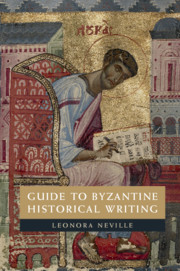Introduction
Published online by Cambridge University Press: 14 June 2018
Summary
This guide aims to make the riches of medieval histories written in Greek easily accessible to anyone who may be interested. It is a gesture of welcome to classicists, to western medievalists, as well as to students beginning their intellectual exploration of the world. While it contains no information that a diligent Byzantinist could not track down with time, gathering the information into one place may help them as well. The purpose is to provide a reliable starting point for research by explaining the basics of what we know about a text and how we know it, while avoiding the repetition of scholarly speculation. Calculated guesswork is part of doing medieval history, and I am all in favor of a good supposition from time to time. Yet often one scholar's reasonable guess is soon cited as fact, so that later readers do not know the relative stability of the ground they are building on. The goal here is to set a firm foundation and let you do the speculating.
Where this guide may innovate is in putting the emphasis on exploration of the surviving texts, rather than on medieval authors. Since the early modern period, scholars have been keenly interested in recovering the biographies of the individuals who wrote the histories, and reconstructing texts that no longer survive on the basis of hints in the manuscripts that do survive. The search for the lives and careers of creative agents was a natural expression of the Renaissance interest in individuals. This basic project animated the field well into the twentieth century, and much of the scholarship cited in the following pages is committed to recovering the lives of medieval authors. Developments in late- twentiethcentury thought, commonly discussed under the rubric of the “linguistic turn,” have shifted the focus of much scholarship from reconstructing individuals to analyzing texts. Quite apart from the changing fashions of theory, the only things available for us to study are texts in surviving manuscripts (throughout this book “manuscript” refers to a physical artifact written by hand). It would seem simply safer to lay the groundwork for further scholarship by focusing on these things in their own right, rather than looking ever past them toward how we imagine their creators.
- Type
- Chapter
- Information
- Guide to Byzantine Historical Writing , pp. 1 - 44Publisher: Cambridge University PressPrint publication year: 2018



